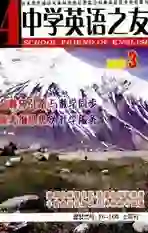七年级(下)Units 5-6同步误用评析
2010-05-29
1. 【read】我在读书。
误:I am reading books.
正:I am reading.
析:read泛指“看书、读书”时,一般不加book,若表示看某本书可说read a(the) book。
2. 【sure】我确信她会来。
误:Im sure of that she will come.
正:Im sure that she will come.
析:be sure“确信”后直接接that从句,不用加介词of。
3. 【wait】我们得等他来。
误:We have to wait for him coming.
正:We have to wait for him to come.
析:wait for sb. to do sth.等某人做某事,句中不定式作sb.的补足语。
4. 【shopping】我们明天去购物,好吗?
误:Lets go to shop tomorrow, shall we?
正:Lets go shopping tomorrow, shall we?
析:表示“去购物”,常说go shopping。类似的还有:go swimming去游泳,go fishing去钓鱼。
5. 【happy】她收到那封信感到很幸福。
误:She is quite happy with the letter.
正:She is quite happy at/about the letter.
析:当表示“因……而感到幸福(高兴)”时,其后用介词at/about,不用with。
6. 【rain】昨天晚上有一场小雨。
误:There was a small rain last night.
正:There was a light rain last night.
析:一场小雨用a light rain不用small,一场大雨用a heavy rain, 不用a big/great rain。
7. 【weather】多好的天气啊!
误:What a fine weather it is!
正:What fine weather it is!
析:weather是不可数名词,故不可加冠词a。
8. 【lying】我看到一本书在地板上。
误:I saw a book lieing on the floor.
正:I saw a book lying on the floor.
析:see sb.(sth.) doing sth.看见某人(物)正在干……,lie的现在分词形式为lying。
9. 【group】一群男女儿童在跳舞迎接儿童节。
误:A group of boys and girls is dancing to welcome the Childrens Day.
正:A group of boys and girls are dancing to welcome the Childrens Day.
析:a group of修饰复数名词,谓语用复数形式。
10. 【surprised】我对你说的话感到吃惊。
误:I am surprised with your words.
正:I am surprised at your words.
析:表示“对……感到吃惊”用be surprised at不用be surprised with。
11. 【everyone】他给了他们每人一本书。
误:He gave a book to everyone of them.
正:He gave a book to every one of them.
析:everyone与every one均有“每人、人人”之意。everyone强调整体,不能接of短语。every one是“每个(人或东西)”的意思,着重强调单个的人或物,可接of短语。
12. 【like】他们和我像兄妹一样。
误:They and I like brothers and sisters.
正:They and I are like brothers and sisters.
析:like作“像”时是介词而不是动词,故前面要加be一类的动词才可作谓语。
13. 【the most】杭州可能是中国最美的城市。
误:Hangzhou may be a most beautiful city in China.
正:Hangzhou may be the most beautiful city in China.
析:the most构成形容词的最高级形式,意为“最……”,the不可省。
14. 【improve】我们希望改进我们的工作。
误:We wish to improve our work better.
正:We wish to improve our work.
析:improve意思是“改进、使更好(make better)”,已包含better之意,故better就多余了。
15. 【in order to】他们努力学习,为了通过这次考试。
误:They study hard in order that pass the exam.
正:They study hard in order to pass the exam.
析:in order that引导目的状语从句,误句中从句无主语。 in order to后接动词原形。
